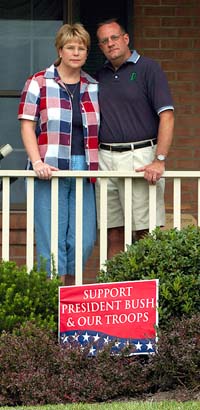|
Article Courtesy of the The Cincinnati Enquirer By
Erica Solvig
LEBANON - Jeb and April Ballentine say they just wanted a way to tell the community to think of their nephew, who is in the Navy and on his way to the Persian Gulf. So, like neighbors Larry and Pam Bohannon, they put up a sign in their front flower garden supporting the troops.
appearances, quality of life and homeowner property values by taking care of minor maintenance tasks and setting standards for everything from paint colors to mailbox sizes.
Although they vary from subdivision to subdivision, restrictive covenants are common. Nationwide, surveys show that most homeowners are pleased with their associations, according to the Virginia-based Community Associations Institute. But critics say covenants often infringe upon homeowners' civil liberties and make rules that would be unconstitutional if governments had made them. Some people have fought their homeowners associations on the issue of signs, but the courts have typically only seen it as going against homeowners' First Amendment rights when the content dealt with political campaigns or religion, according to George Staropoli, an Arizona man who founded Citizens for Constitutional Local Government. In the Country Creek case, he says, the homeowners might contend that their signs are political. "What it all comes down to is when you sign your homeowners agreement, it is a private contract," Staropoli said. "Under that private contract, the Bill of Rights basically doesn't apply. There's no law in the books saying you have the right to support our troops at war. Someone would have to take it to court and justify it." In Country Creek - a two-decade-old subdivision of multi-acre lots with homes typically valued between $200,000 to $300,000 - the association's attorney, Paul Saba, says he is not aware of any previous legal challenge to its covenants. "Everyone has always cooperated," association board member Scott Burris said of Country Creek's restrictive covenants, adding that they were recently updated. "We've never had to enforce it. All we've had to do is tell somebody." The covenants are part of the property records and even though neither couple signed a copy of them, they agreed to them when they bought the property, Saba says. The Ballentines and the Bohannons say they didn't think twice when they put the yard signs up earlier this summer. But then both families got word from association board members that the signs had to go. At first, April Ballentine said she did take hers down, but then she said she thought again. "It's really against our civil liberties to take it down, so I put it back up," the mother of 8-year-old twins said. This month, they got a letter from Saba, stating that this was not a First Amendment issue and that the association would seek a court order to get the sign down. "The letter is really about fulfilling previous commitments and obligations, and not so much about trying to regulate their speech," Saba said. "We don't trample on their constitutional rights. In fact you don't have a constitutional right here, because the constitutional right is that the government will not restrain your speech and will not regulate the content of your speech."The two families are not giving up. The Ballentines are bringing their lawyer when they meet with association board members to discuss keeping the signs. Both couples say they also want to remove the sign regulation from the restrictive covenants, a change that would take approval from 75 percent of the 52-home subdivision. "You get into the definition of what a sign even is," said Pam Bohannon, a 57-year-old mother of two grown children. "If we don't draw a line in the sand right now, at Christmas time, they could make you take down an angel." Another option would be to get the state legislature to pass a law prohibiting homeowner associations from regulating yard signs. That was what Rep. Tom Raga, R-Mason, did with flagpoles when a couple of other Warren County homeowner associations banned homeowners from having them. Raga said he hadn't been contacted about the Country Creek sign case, but would be willing to look at it. The Ballentines and the Bohannons say they don't want to get into a legal battle, but they aren't ready to give up. "If it came down to it, I would move before I'd stay in a neighborhood that I can't be free in," Jeb Ballentine said. |
 |
 |
 |
